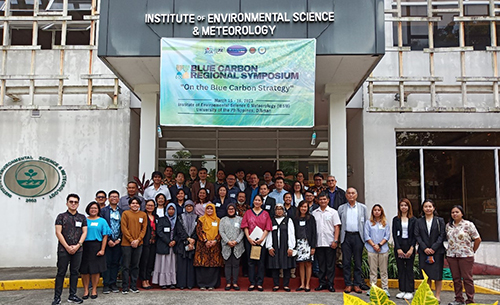Philippines, Indonesia and Japan lead efforts in blue carbon conservation to address climate change
2023.04.04
The Philippines, Indonesia, and Japan combined efforts to boost blue carbon ecosystem conservation, improve disaster resilience, and mitigate climate change.
Japan International Cooperation Agency's (JICA) technical cooperation project, the "Comprehensive Assessment and Conservation of Blue Carbon (BC) Ecosystems and their Services in the Coral Triangle" or BlueCARES pioneered efforts on joint research on blue carbon ecosystems to form a conservation strategy at both local and national levels. BlueCARES is supported by JICA through the Science and Technology Research Partnership for Sustainable Development (SATREPS) scheme, in close cooperation and consultation with the Japan Science and Technology Agency.
The project which started in 2017 recently held Blue Carbon Regional Symposium in Metro Manila to share their findings and results as part of its concluding activities.
Blue carbon pertains to the carbon captured and stored in coastal and marine ecosystems such as mangroves and seagrasses. When these ecosystems are destroyed, they emit the carbon they have stored into the atmosphere which cause greenhouse gases to increase. Hence, by protecting these coastal ecosystems, climate change can be mitigated. Selected sites in the Philippines and Indonesia that are part of the Coral Triangle or the world's biodiversity center, form part of this cooperation. The University of the Philippines (UP) Diliman led in implementing the project on the Philippine side.
"The Blue Carbon Strategy, which will be based on project's research findings, should serve as a guide for stakeholders in conserving blue carbon ecosystems and improving its resilience. We hope that what the project has started will be continued by our counterparts to ensure sustainability," said JICA Senior Representative IDE Soichiro.
The project is complemented with research on mangrove forests and seagrasses. In the Philippines, its main sites are Palawan, Northern and Eastern Panay Coast including Aklan, and Eastern Samar, with Bolinao and Boracay Island as sub-sites. The project has also provided equipment to implementing and collaborating partners and sent Filipinos to Japan for short-term training. Furthermore, Assistant Professor Dr. Ayin Tamondong of UP Diliman Department of Geodetic Engineering was also sent to Tokyo Institute of Technology for her PhD to study mapping and monitoring of seagrasses in the Philippines, a key marine resource that sequesters and stores blue carbon.
Aside from field surveys and knowledge sharing activities, the cooperation also gathered various stakeholders such as government agencies, local government units, the academe, and non-government groups to establish a Blue Carbon Network (BCNet) in the Philippines. The project has conducted capacity development activities for these stakeholders. The BCNet is expected to continuously implement field surveys, conservation activities, and the BC Strategy beyond the end of the project. This year, the project has also conducted Blue Carbon Stakeholders Summits in Aklan and Tacloban to discuss research findings and the use of the BC Strategy.
With the support of the project, a Memorandum of Understanding of stakeholders in Aklan was signed in January this year establishing the "Aklan Rivers, Bays, and Coasts Integrated Management Council." BlueCARES Japanese and Filipino experts were also involved in finalizing the draft Aklan Provincial Ordinance for securing the sustainable implementation of the said Council.
Dr. Yasmin Tirol of Aklan State University, BlueCARES local collaborating partner, shares her expectations saying, "Together with LGUs, and community stakeholders, we look forward to disseminating research results towards mobilizing an integrated management body and operationalize an action plan for a localized BC Strategy."
To know more about BlueCARES, you may visit this link

Participants from Philippines, Indonesia, and Japan during the Blue Carbon Regional Symposium held at UP Diliman

During remote sensing activities in seagrass and mangrove ecosystems in the Philippines by BlueCARES researchers.
scroll